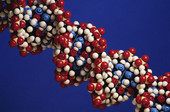
TUESDAY, Dec. 22 (HealthDay News) — A single treatment with a new method of gene therapy may offer lifetime protection against the progression of the lung disease emphysema, according to the results of a study in mice.
The most common form of emphysema in young people is Alpha-1 Anti-trypsin Deficiency, caused by a mutation in the alpha-1 anti-trypsin gene, the authors of the study pointed out.
In experiments on mice, researchers at the Boston University School of Medicine developed a system that can deliver genes selectively to as many as 70 percent of the lung’s alveolar macrophages, which play an important role in emphysema.
Using this new approach, the researchers achieved sustained expression of normal human alpha-1 anti-trypsin (hAAT) protein at levels that improved emphysema in mice.
“The lung macrophages carrying the therapeutic gene survived in the lungs’ air sacs for the two-year lifetime of the treated mice following a single intra-tracheal injection of the lentiviral vector we had engineered,” study senior author Dr. Darrell Kotton, an associate professor of medicine and pathology and co-director of the Center for Regenerative Medicine at Boston University School of Medicine, said in a news release.
“Our results challenge the dogma that lung macrophages are short-lived and suggest these differentiated cells as a target cell that may be considered for in vivo gene therapy applications, including the sustained correction of hAAT deficiency,” lead author Dr. Andrew Wilson, an assistant professor of medicine, said in the news release.
The study was published online Dec. 21 in the Journal of Clinical Investigation.
More information
The American Lung Association has more about emphysema.

